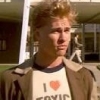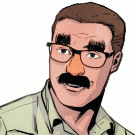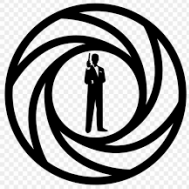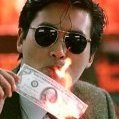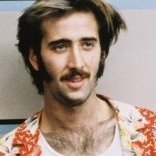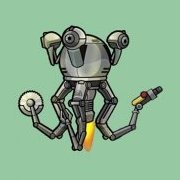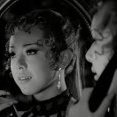Leaderboard
Popular Content
Showing content with the highest reputation on 05/11/20 in all areas
-
6 pointsI am admitting that I have lost all track of what's been done so my apologies if this has been covered recently. Also I had a hard time picking because there's so many things I want us to talk about but it's impossible to narrow them down. Ultimately I think it's time to talk about... Feel free to watch the sequel as well, because I certainly will.
-
5 pointsThe comic book adaptation of the film script expanded on the significance of the neighbors. The mother is visited by a police detective who tells her the neighbor she testified against is being released from prison due to the parole board judging him unlikely to reoffend. She says she's been afraid for ten years of him returning. Deebs knows Jennifer or knew her 10 years ago. The interactions between them goes further where he goes to see her school play even though the mom does not want him around. There's a weird attraction thing going on between them in a couple lines that's so much worse with that context. The comic book expands the "Sweet Place" and it's an area where things are different. It's more kid friendly but Deebs ends up sick from the sweets. Also, a major shout out to the George Herriman reference at the end. George Herriman created Krazy Kat and Ignatz Mouse. The landscape is from that comic strip. Pretty fitting for a comic creator to wind up there. The ending has a cool moment where the Cool World starts turning human while the real world turns doodle. The ending for Deebs is also a little different where he's left all alone.
-
4 points
-
4 points
-
3 pointsYes! For Lonnette too! I was like, “Enjoy your eternity of joyless, cartoon sex, I guess.”
-
3 pointsThere was one moment in the movie that really bummed me out. Not the death of Brad Pitt's mother but rather the said reality of what it means to be a doodle. When Holli is first explaining to Brad Pitt why she wants to be human she talks about the power that noids have. She says "When they touch something they feel it and when they taste something they really taste it and when they do it with a man they really do it." When you think about it it makes sense. Doodles and get blown up, smooshed, beat up and twisted all about and that's because they feel nothing. There is a masochist goon character in this movie who is being tortured just because he too wants to feel something. They have no need to eat or drink which means there is no fun or joy in their bars and dinners. Imagine a life where you only have the senses of sight and hearing and that's it. It's a boring dull life and making connections with others is hard and ultimately not fulfilling. It is a hell and no wonder she wants out. Also if when doodles do it they don't really do it, I feel very sorry for Brad Pitt at the end of the movie...
-
2 pointsI know the original story idea was for an R-rated movie, but did they also originally have an R-rated cut of this movie? There were several times where it felt like an edit was made that removed some of the more explicitly sexual content. For example, it felt like they filmed and then cut out a scene of Holli giving Deebs oral sex in front of the neighbor and her mom.
-
2 pointsWhen Nails is scaling Holli’s tower and hauling Harris behind him, how come they didn’t go the distance and just have Brad Pitt grabbing a web coming out of Nails’ anal gland? This 100% feels like the type of movie to go there, why chicken out?
-
2 pointsGreat episode -- honestly, it's kind of a thrill to watch (or listen to, in this case) someone tear into a sacred cow. Amy pulls no punches -- Kael would be proud. But I've still got bones to pick. Re: the last thirty minutes: of course the brother and the dinner aren't as important as the guns or the drugs. If Henry still had his life under control, he would know that, but he doesn't. He's too coked up for that. His mind is mush, he doesn't know which way is up, and he has no sense of priority. It makes no sense for the Henry Hill of the first half to make these kinds of mistakes, but that Henry Hill doesn't exist anymore. Amy and Paul both talked a fair amount about the relatively short life span of a mobster -- that's what this last third of the film drives home for me. Sooner or later, everyone makes a mistake, especially the ones who can't keep their noses clean. In a funny way, though, drugs kind of save Henry Hill's life. If it weren't for the blow, Henry might have stayed in the business long enough to get killed or wind up in Sing Sing for life. Death or prison - there's no other ending. To pivot to another problem Amy has with the movie, I think this is what's going on for Jimmy in the scene where he destroys the phone booth after hearing about Tommy's death. It's not so much that he's grieving the loss of his friend -- he's grieving his own life. Out of the three of them, Tommy was the only one who could get made, and even he ends up getting whacked. On some level, I think Jimmy realizes in that moment that the same thing is going to happen to him. He's dedicated thirty years of his life to a business that will literally kill him one day. That's the deal he made -- it's the same deal every gangster makes. And sure, on some level, every one who works for the mob knows how the story has to end, but it's human nature to think that your story is going to be different, right up to the moment that someone puts a gun in your face. Not everyone gets to have that moment of reckoning. (SPOILERS FOR THE IRISHMAN) Interesting, too, to think that De Niro goes on to play Frank Sheeran, another character who has to reckon with the trade-offs he made for a life in organized crime. The Irishman and Goodfellas both are sort of "best case scenario" mob movies: either you end up in witness protection, or you get out of jail an old man and you die alone, ruminating on the lives you ended, the people you betrayed and alienated, all for what? As for why there are so many mob movies on the AFI list, I think that there's something uniquely American about mob stories. These films -- Goodfellas, The Godfather Saga, even On the Waterfront -- are all about the intersection of business and family. Sometimes that family is aspect is literal, but for the most part it's a metaphor or a stand-in. I think a lot about the language used in American businesses, big and small, that emphasize the importance of family. The implication is, particularly in more working class jobs, that you should be willing to make sacrifices for your bosses and co-workers, that your co-workers are your brothers and sisters, and that your bosses are Mommy and Daddy. They'll protect you, they say. They'll take care of you, they say. So you stick your neck out for them, you work hard and they reap the benefits of your labor (I'm starting to sound like the communists in Hail, Caesar!), and you don't ever dare to question their authority, even when you're putting your own family at risk (for an example, take a look at the way major corporations are treating their low-wage employees in the middle of a pandemic). Mob stories have an intrinsic relationship to American capitalism -- trick people into doing dangerous work for (relatively) low wages by exploiting their relationship to the word "family." Sure, the characters in Goodfellas and The Godfather seem to be pretty well off, but then every corporation needs upper and mid-level management. On the Waterfront and The Irishman are about the grunts. In any case, great episode as always, but if anything I think Goodfellas should be WAY higher on the list.
-
2 pointsAs the gang and others have already stated, I really had a hard time understanding what was actually happening in the movie. Like, I got the broad strokes of it all, but when it came down to the details, motivations and plot points would seemingly change on a whim--which is truly bizarre in an animated movie. For instance, when Doc Whiskers and Holli meet in Las Vegas, she tells him she wants it so that she can be real. He responds by saying that getting the Spike is impossible, because when *he* tried (because I guess he was trying to become human too?) it almost killed him. But in the very next scene, he tells Deebs and Harris that if she removes the spike it will destroy both universes. So...which is it? Does removing the Spike turn you human or does it destroy the multiverse? And if Doc Whiskers knew that removing it would destroy both universes, why did he even attempt to remove it? I feel like his character is far more insidious than we are led to believe. Of course none of this really matters as the result of removing the Spike turns out to be a completely different scenario in which no one turns human neither universe is destroyed but rather combined.
-
2 pointsThis was a pretty frustrating episode to listen to. I love hearing opposing viewpoints as it makes me think critically about why I personally may like or dislike something, but the complaints Amy had for Goodfellas felt so off-base and nit-picky that I wasn't sure if she was doing a bit or not half the time. Briefly, regarding Henry's love of cooking seemingly coming out of nowhere, I agree with Paul in that I don't think we need a scene that establishes his love of sauces or cooking for it to "make sense" that he is cooking at the end of the film. As was stated in an earlier post, that completely misses the point of the scene and how it's intentionally manic because he's high on coke. That being said, they totally do establish his love (or at least knowledge/interest) of cooking (and specifically sauces) during that first scene in the prison when they are having dinner. The scene opens on Paulie thinly slicing garlic with a razor as Henry's narration explains that this "very good system" allows the garlic to liquefy with a little bit of oil. He then complains that Vinny uses too many onions in the sauce he cooks, though it's still very good. The scene is a full minute of Henry talking about and critiquing cooking. Now, for my experience: I first saw Goodfellas when I was a teenager and had dismissed it as a typical gangster film that glorifies being in the mob. I realized during this rewatch just how wrong I was and I ended up, surprisingly, loving this film. I think there are maybe 2 or 3 instances that briefly show some benefits to the mob life such as having the mail man roughed up or the aforementioned dinner privileges at the prison. But for every seeming benefit there are half-a-dozen horrors tipping the scale back: Dealing with psychotic men like Tommy who have no qualms about killing anybody for almost anything; the creeping realization that the whole "family" thing is BS and that ANYONE may turn their back on you or kill you for any reason; the ever-looming risk of going to jail; having to bury bodies; the list goes on and on. This time around I did not feel like it glorified the life at all. Much like Fight Club or The Sopranos I'm shocked by how many people watched this film and thought "yeah, that's so badass, I wanna be like that." You'd have to completely ignore the messages of these films/shows to think that Tyler Durden or Tony Soprano were people to idolize or that the mafia was a cool organization to join. All that said, while I ended up loving this film so much more than I thought I would, I have to admit that there are a handful of Scorsese films that I think deserve spots on the AFI top 100 above this. I find Scorsese's films that deal with faith and religion to be so much more interesting and thought-provoking than any of his mob films (haven't seen Casino, though) so I would gladly take Kundun, The Last Temptation of Christ or Silence before Goodfellas any day of the week. I still voted to keep it on the list as I think it's a vastly superior to 90% of the other films currently on the AFI Top 100.
-
2 pointsI thought the entire movie is that Henry Hill is supposed to be an unreliable narrator. The highs are never that high. The lows are never his fault. And with what we know from the real life person, that seems consistent with who he is. I feel like a lot of the inconsistencies (but certainly not all of them) are tied to Henry Hill saying one thing and him just being wrong. If Amy doesn't like the movie, that's fine. I like the movie okay but am maybe not a huge fan of it either. I genuinely agree with the criticism that Pesci is too old but I felt like the rest of her criticisms didn't make much sense. Especially the sauce argument. It's such a huge stereotype that Italian Americans love sauce that I don't think we need our hands held with an earlier scene of it. Unless the movie makes a point of saying "this guy really hates cooking" I won't balk at them showing an Italian American cooking tomato sauce.
-
2 pointsAmy you have completely misread the last 30 minutes of Goodfellas. The prominence of the making of the food and the brother in the 3rd act has absolutely nothing to with Henry Hills relationship to them. It is merely meant to show his state of mind. That it is jarring to the audience is precisely the point. The film isn't trying to say he goes out of his way to pick up his brother and make him his favorite meal amid all the craziness because of some great love or loyalty. He's out of his mind on drugs, he shouldn't even leave the house. The fact that stirring sauce and trafficking guns and drugs is given the same weight by the narrator is insane and that's the point!! He has lost the ability to tell the difference between the mundane and ultra serious parts of the story he is telling. These things had only been shown in background up until now because they were incidental to the story. They still are but he's so off the rails there is no difference in his mind. This is exactly the way that someone that coked out would tell it. It's actually brilliant.
-
1 pointI haven’t watched the movie yet but I will (??). I just wanted to say that it was extremely funny hearing everyone on HDTGM try to describe the plot. Every time someone—especially June—started a sentence making a semi-serious point saying “So when Doc Whiskers...” , I burst out laughing at how preposterous it sounded.
-
1 pointYou know I got bad vibes from him too! First, it's Maurice Lamarche! Brain himself! Kiff! Egon! A million other things! So he's an incredible talent and I don't want to fault him but certain lines of his had real sinister line readings. I keep wondering how good his intention were as well.
-
1 pointI like your version of things better. There is serious thought and metaphor put into it. I watched the movie and knew that they didn't put either of those things into it so I went by what dialogue I could find.
-
1 pointOk, this is my first “official” playlist (as opposed to a link of my ENTIRE catalog of music)! It runs a little over an hour. The Musicians (in alphabetical-ish order)!: A Tribe Called Quest Andre 3000 Beastie Boys Bjork Ghostface Killah Janelle Monae Janis Joplin Minnie Riperton Pixies Rage Against The Machine Spoon Superorganism The Beatles The Flaming Lips The White Stripes They Might Be Giants Weezer Enjoy!: https://open.spotify.com/playlist/3W6w1x1X9ZY4t5xDfXXMKg?si=91l8ZrJXRdeWK95ySg0siA
-
1 pointI couldn't help but join the conversation on this one. Here we go... I think others have done pretty good work on the fictional cosmology here. Cool World and our world are part of a multiverse with different levels of chaos/malleability. Our world is pretty solid, while CW is much looser and more easily influenced by visitors (hence the power of ink). Sometimes people from this world can cross over into other worlds in moments of extreme emotion. Mostly they write it off as dreams or visions. Harris visited in a moment of trauma and just flat-out stayed (I'll get back to that in a second), while Jack visited in reaction to his own self-inflicted trauma and turned it into a successful comic book from prison. The stuff with Doc Whiskers and the Spike are pretty well explained elsewhere in this forum. So I'll jump to theme. The movie Cool World is about dangerous imagination. Harris is unique in that he displays practically no imagination. He's Officer Friday crossed with Spock. His retreat into Cool World makes him an anomaly there, a force of rational order in a world of chaotic imagination. So of course he becomes a cop - it's a metaphorical way (which is how CW operates, really) to reconcile his presence there. Harris is also kind of the early 20th century response to dangerous imagination - keep it under wraps and regulated and absolutely NO SEX (think the Hays Code or the CCA). That brings us to Jack. He taps directly into messy, chaotic CW and instead of trying to control it, he turns it loose in the form of a prison comic. He's kind of a stand-in for Bakshi and Crumb and those underground comix guys that shrugged at codes and rules and went wherever their imagination took them, usually into a more extreme place like CW. Holli places in as the seductive and destructive lure of that world, and if we stick with this logic, removing the Spike shows what happens when that lack of intention with regards to creation gets out of control. It is shown to be ultimately unfulfilling and potentially destructive. In the end, while Jack does replace the Spike, he's consumed by his own id (becoming animated and stuck with Holli). Harris on the other hand, through his resurrection as a doodle, embraces his own imagination. So thematically, Cool World wants us to know that we can't deny our creative impulses, but we shouldn't give into them either. Of course, it's also a terrible movie that was put through a blender by the Hollywood system. I can't necessarily say that any of this really works, but it was fun to think about while listening to the episode. Thanks for that, guys.
-
1 pointThe gang all had different interpretations regarding why Holli and Deebs reverted to the doodles they did at the end of the movie. In particular, they wondered why Holli didn't just revert back to her original design. My interpretation of it was that a Noid turning Doodle will become a caricature of their inner self. When it first occurs to Deebs, he becomes a kind of a cartoonish bum. As for Holli, as she insists on drawing attention to herself in increasingly ridiculous ways, her new Doodle form becomes a kind of bizarre clown monster. She doesn't become Holli as she was, because, as a Noid, that is no longer a reflection of who she is. This is also why when Deebs achieves self-actualization and give up his selfish ways in order to stop Holli, he goes from being a trash bag doodle to a superhero .
-
1 pointI have no idea how I keep making my replies so janky. I don't know what it says about me that (I think?) I understand this messy movie. So Cool World is an alternate dimension, Deebs didn't create any of it. They make mention a few times that Cool World has always existed and that humans have passed through it very briefly. We also see that at least one film from our universe has made it into Cool World. My assumption is that this happens after Doc Whiskers opens the dimensional portal into our 1940s and sucks Harris in. The rift between dimensions is now tenuous and certain individuals- the movie doesn't explain but let's just say through dreams or comas or mental breaks or some unknown set of circumstances- can pass briefly between worlds. This is how Deebs is entering Cool World prior to his introduction in the movie. He thinks he's just dreaming up a fantasy world and makes a comic series off of it. Doc Whiskers probably had the sense that beings from each universe cannot come together because it would start the destruction of one or both worlds. Time travel stories all have that rule about not interacting with past or future versions of yourself, I'm not sure if that rule applies to multi-verse stories as well, I don't really read those. At some point after settling Harris into Cool World, Doc Whiskers enters our world as he previously had planned and takes the spike with him. Holli wants to enter the world she's seeing in the film(s) and though Noids; she has all Cool World has to offer and now wants what she can't have. I think she and Deebs start doodling out because they've broken the laws of physics in our universe and can't sustain form. But I'll give you this one; I have no idea if Harris knew he could come back to life as a doodle after being killed by a doodle. That's the only part that doesn't make sense.
-
1 pointI feel kind of the same about his brother suddenly being important. I think it's a more valid point, but another huge stereotype of Italian American mafia movies and families is the importance of family while also being really shitty to them. So, his brother being important is awfully convenient, but not a deal breaker. I don't think she's wrong to point this stuff out but her biggest arguments felt like nitpicks to me. I'm certainly guilty of that myself but I was expecting much more substantive arguments from her after Paul said the episode of The Canon was convincing. I'm not sure I agree with your point that Pesci being too old cements that his behavior isn't sustainable. I think it kind of proves that it has been sustainable for him if he's made it to 47 acting that way. His connections have covered for him long enough that he doesn't need to learn. With a younger actor, it would feel more to me that this will probably be his downfall. But Pesci is so good in this that I guess I don't care. So, I get Amy's point here with Pesci's age. I've seen this a couple times and I guess I never even thought of Joe Pesci and Ray Liotta as childhood friends even though that's clearly what they are supposed to be. But I understand Paul's point as well. If you're going to have a movie take place over 20-30 years, how do you cast that? Typically it's young people who eventually get grey hair wigs and makeup but I don't see why de-aging people is a problem either (except that it usually isn't convincing).
-
1 pointI've fallen behind in these covid times (and unfortunately on the slew of movies I mostly haven't seen - I've been relatively busy). I still need to rewatch Goodfellas, and being someone who remembers being mostly "meh" on it (and I think I'm more meh on mob movies), I found Amy's two big complaints to be exasperating in such a way, I just assumed she mostly argued a much higher level thesis on The Canon episode and this was her wrestling with details of why this movie doesn't work for her - which seem like mostly nitpicks. Though, I am also confused by the idea that someone who went into details of how food was prepared in prison would be considered someone who wouldn't cook seems weird to me.
-
1 pointThe most improbable thing in this movie was not the existence of an alternate dimension cartoon world but that Jack Deebs channeling his vision of it into a comic book would be a huge hit. I was curious if anyone had theorized what the content of those books would be and found that DC published a 4 issue Cool World prequel comic to go along with the release of the movie. The first issue can be bought online right now for $2.60. It retailed for $1.75 at the time so its value hasn't quite kept up with inflation. They have also been posted online. http://vlcomic.com/read/comic-cool-world-eng/1 I read the first issue and here are some highlights if you don't want to waste your 10 minutes. Harris is a petty criminal in the first issue not a detective. Almost every object in the comic is anthropomorphized. Cool World is one of (many?) cartoon worlds it is right next to Sweet Place. Holli tries to seduce Harris to get to the real world but he won't break that rule even though he is a criminal. Another human enters Cool World while he is dreaming so presumably other than Harris and Deebs that is how Noids get to the cartoon dimension.
-
1 pointI remember Amy going on about the pasta sauce in The Canon episode about this movie too and found it an equally exasperating point. On Pesci: for me having an older actor in this part kind of subconsciously suggests to the audience that, yeah, this guy is too old to be acting this way and it's definitely not sustainable for him. Not sure if that was intentional or not, but I think this gives the character a greater undercurrent of menace from the beginning.
-
1 pointAnd the other characters in the movie literally tell this to him. Both Paulie and Jimmy tell him he needs to lay off the drugs because they're turning his "mind into mush." This whole sequence demonstrates that. Within this sequence we also have a direct refutation of the idea that Henry's narration only repeats to us what's on the screen: the guns he brings to Jimmy are clearly crap, as we can see from the visuals. Jimmy is right to reject them. Yet Henry's narration acts like Jimmy was crazy to turn them down. He's not reliable, and the movie wants you to know that. The narration puts you at a distance on purpose.
This leaderboard is set to Los Angeles/GMT-08:00
-
Newsletter

